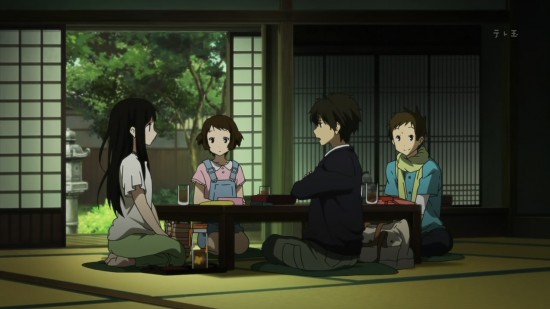Hyouka has completed 2 major story arcs and a couple of minor stories. At this point I think I have a better feel for what it is about. It is something that is pretty unusual: a series of classic detective stories. Anime includes lots of “mystery” shows but few of them qualify as real detective stories.

I would say that a “classic detective story” should meet these requirements:
- The detective must be presented with a crime or other mystery, along with the clues needed to solve it.
- The audience must be given the same information in order to give them a chance to solve it
- The detective may not make use of any supernatural powers but must rely on observation and deduction.
- If the detective has any specialized sources of information (e.g. Sherlock Holmes’s encyclopedic knowledge of current affairs and mastery of forensic science) then he must present this information to the audience in time for them to make use of it.
- The detective will solve the mystery, hopefully before the audience does. However he must first dispose of alternative explanations, pointing out the flaws in each one.
It is understandable why this is rare in anime (or for that matter on American television.) It leads to a cerebral show with lots of exposition and few visual thrills. The director will be under constant pressure to include “less talk and more action” which will tend to ruin the formula.
So typically we have instead some exciting action scenes after which the detective waves his hands wildly and pulls a solution out of the air. To make this more satisfactory the audience is often given the answer well in advance so that they can feel relieved when he finally gets it.
Last season’s Gosick is a typical example. (You may recall that I ended up classifying it as “gothic horror/romance”.) Gosick was full of references to classic detective stories and real historical mysteries, but in the end Victorique always ended up solving the case using some sort of supernatural ability.
This helps explain why many people complain that Hyouka is talky and slow-moving, with mysteries set up in an arbitrary way. It goes with the territory and you need to have a taste for this sort of thing to appreciate it. It probably doesn’t help that the show specializes in the sort of mysteries that real high school students in a peaceful small town might actually encounter–not actual crimes, just small puzzles about human behavior.
However if you like that sort of story you will probably like this. The production values are high, the characters are likable and the writing is low-key but clever.
Houtarou fits the common pattern of an eccentric cantankerous detective. The onsen episode makes me wonder whether he belongs in the subset of cantankerous detectives with physical disabilities. Note how he passed out in the hot bath. Is his obsession with “energy conservation” a side effect of anemia or an undiagnosed heart condition?
While I’m speculating, is there an unacknowledged love polygon going on here? I could easily make a case for Mayaka => Satoshi => Houtarou => Eru. If you believe the fanciful ED (which I don’t) you could add Eru => Mayaka, making it a circle. There’s really no support for that in the story though.
In my initial post I joked that they might end up investigating a grisly murder with dismembered corpses. I guess the joke was on me since in the last story the Literature Club was shown an unfinished student film featuring a grisly murder with a dismembered corpse, and challenged to figure out based on the clues in the movie how the missing screenwriter intended to end it.
Asking our fictional detectives to solve a fictional murder allowed the show to get very meta, with discussions about the different mystery genres and the important distinction between mystery and horror. Some bloggers found the whole thing extremely annoying but I was charmed by the convoluted whimsy. I am looking forward to see what they come up with next.

